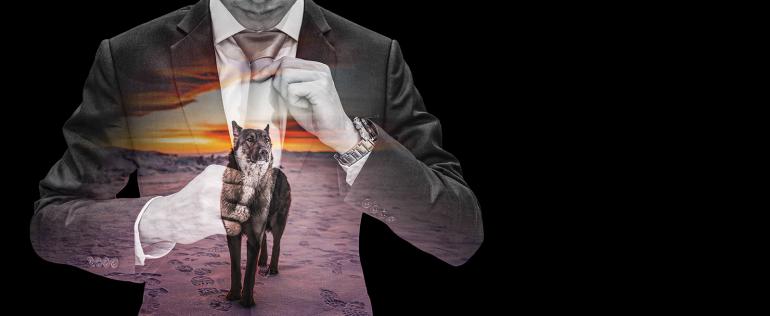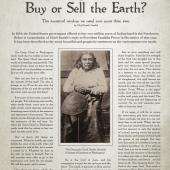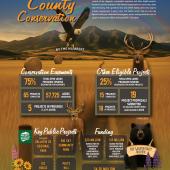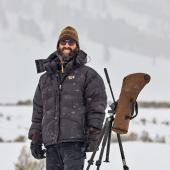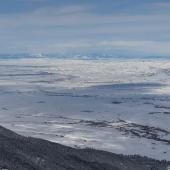The Wolf in the Room
When politics and wildlife collide.
Relationships are a two-way street, and humans’ relationship to nature is no exception. Just as some have an affinity for the natural world, others have hastened its destruction, and still others have developed a condition known as biophobia, or the fear of nature. Over time, we’ve distanced ourselves from the close connection we once had with the natural world, arriving at the modern lifestyle we enjoy today.
To counteract a sense of loss, however, many of us strive to get back to that original closeness we once had. In doing so, we’ve run headlong into old stereotypes and beliefs about our environment—beliefs that have been deeply ingrained in our society for generations. There seems to have always been a contrast between those who want to protect the environment, and those who see it as a money-making proposition. Time has not changed this dichotomy. It’s frustrating, especially to those who think our society should be more advanced in our ability to use science and conservation principles in the 21st century.
Which should be the driver: science or commerce? This is the fundamental question of the day.
We live in a world today where many people believe that their individual rights supersede those of the common good. This ideology has meshed nicely with the politicization of wildlife, which has pushed the best available science and our longstanding conservation-minded principles to the backburner. There seems to be a tendency to raise the ire and hatred against certain species; to want them extirpated from the landscape. A philosophical phrase that describes this behavior is that of speciesism: the belief that certain species are inferior to others or that humans have the right to use nonhumans as we see fit. I want to be clear: we should abhor such ignorance and arrogance. Much of this prejudice—but not all—is exacerbated by special-interest groups who have either a financial or personal interest in pitting one species against another.
This dichotomy within wildlife conservation has also resulted in direct attacks on predators, with the belief they are deserving of man’s brutality. These attacks are based upon years of historical hatred and fears, many of which are derived from our European ancestry. The pervasive feeling that the only good predator is a dead predator has been the norm throughout the American West for centuries, much of it stemming from the Manifest Destiny idea of taming the land.
Any species that we think interferes with our private operational or transactional interests on public land is vilified—which gets to the root of the problem.
But our sensational desire to kill predators has upset the ecological balance across our largest ecosystems, and is prevalent today more than ever. It is a direct result of man manipulating the conversation, allowing our fears and superstitions to drive political discourse, rather than utilizing scientific rationale to drive policy. Essentially, some in our society believe we have the right to overrule the laws of nature for the benefit of mankind, and that by doing so we can also extirpate those that cause us perceived harm.
However, this belief is not held just for predators. It has evolved toward other species as well, such as our national mammal: the bison. Any species that we think interferes with our private operational or transactional interests on public land is vilified—which gets to the root of the problem. Some see wildlife and their natural habitat as ways to further commerce, and others see those same entities as just that, things that exist in and of themselves, having their own independent value; their own intrinsic value. They are things of necessary value for the quality of life on this planet and man has no right to deplete their existence for monetary exploitation. The last two legislative sessions in Montana are direct evidence of exactly that: the politicalization of wildlife.
We live in a world today where many people believe that their individual rights supersede those of the common good.
Which should be the driver: science or commerce? This is the fundamental question of the day. Commerce alone will cause extinction and exploitation. Without sustainability, that will be the result and it is science that provides sustainability. We began this discussion to determine why there is so much vitriol in how segments of our society view our natural world. In simplistic terms, whether you believe it or not, or whether you like it or not, it comes down to what we are willing to accept. Will we accept wildlife and the wildlands as they are, or will we change them to what mankind wants them to be? It comes down to whether we want to understand the complex, interrelated world in which we live, or if we are willing to accept something less.
It is time to renew our pledge to become better stewards of the Earth. Much like what E. O. Wilson taught years ago, biodiversity drives our planet. If we don’t make a renewed effort in the coming decades, we will constantly fail in our greatest global and domestic challenges. If we can’t live among our fellow inhabitants, if we continue to drive them out, we will have failed ourselves.
Clint Nagel is president of the Gallatin Wildlife Association.


